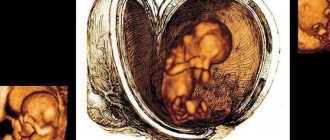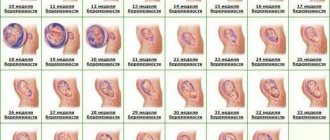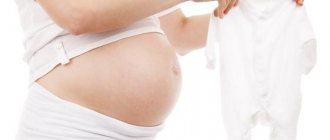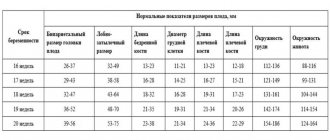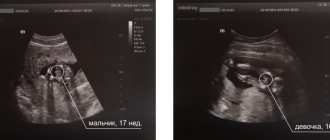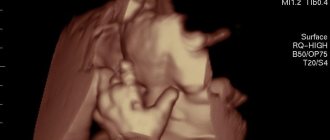Photo: UGC The long-awaited third trimester, which brings the baby closer to birth every day, begins at the 28th week of pregnancy. It approximately corresponds to the end of the seventh month, and at this time it is especially interesting to find out what the baby looks like at 28 weeks and what the baby’s weight already is. At 28 weeks, the baby is not yet ready for life outside the womb, so the woman should be careful and continue to be regularly monitored by specialists.
Body changes and new sensations for women
The growing uterus in late pregnancy puts pressure on the veins in the pelvic area and disrupts blood circulation in the lower extremities.
As a result, mothers at 28 weeks often encounter such a phenomenon as varicose veins during pregnancy. This disease occurs in almost every third woman expecting a baby. And with subsequent pregnancy, the likelihood of unpleasant symptoms increasing. However, most often the dilation of the veins is still temporary and after childbirth the pregnant woman’s condition returns to normal. How does varicose veins manifest? The venous walls become thinner, the lumen of the vessels increases, small blue-purple spider veins appear on the legs, and the veins themselves often appear. The reasons for the development of varicose veins can be not only genetic predisposition, but also poor nutrition, prolonged exposure to the sun, and excess weight. During an “interesting situation,” surgical treatment of the disease is contraindicated—the doctor prescribes special ointments and gels for the patient that have an anti-inflammatory and decongestant effect.
Possible problems
Pain
Along with the growth of the fetus, the body weight of a pregnant woman also increases, which leads to unpleasant painful sensations in various parts of the body. For the most part, the pain goes away quickly. If they bother a woman more and more often and intensify, then she should definitely see a doctor.
- Lower back pain is caused by a shift in the center of gravity and increased stress on the muscles and ligaments of the back. Sharp and jerky pains that often occur during premature birth are dangerous.
- Pain in the lower abdomen and hypochondrium can be disturbing due to excessive activity of the child. As a rule, the discomfort goes away as soon as the baby takes a comfortable position. However, if the pain intensifies, nausea, vomiting and lack of appetite are observed, then this may be urolithiasis. Urgent consultation with a specialist is needed.
- Leg pain is caused by swelling. The 28th obstetric week of pregnancy is a period when the amount of fluid in a woman’s body sharply increases due to an increase in the volume of amniotic fluid and the mother’s increased need for plenty of fluids. If fluid accumulation is not controlled and causes severe discomfort and even pain, this is a problem that can cause complications. The most common include varicose veins in the legs and late toxicosis (preeclampsia). With gestosis, a pregnant woman suffers from severe swelling and high blood pressure. The expectant mother constantly feels nauseous, suffers from dizziness and ringing in the ears.
Discharge at the 28th obstetric week
At week 28, you should be careful about your discharge. If they have a uniform consistency, a whitish color and a slightly sour smell, this is normal. If the smell has become pungent, streaks of pus or blood have appeared, then this is an alarming sign of infection in the genital tract. The first step is to visit a doctor to diagnose and treat the disease.
Watery discharge may signal the onset of premature labor. If there is a large outpouring of water, it is necessary to urgently call doctors who will hospitalize the pregnant woman.
If fluid is released in small quantities, it is best to immediately inform your gynecologist. The doctor will examine the patient and determine whether preterm birth can be prevented.
Uterus at 28 weeks of pregnancy
The height of the uterine fundus is on average 28 cm. The gynecologist measures this indicator at each appointment to ensure the correct development of the child. The walls of the uterus stretch as the fetus grows until the moment of birth.
- The expectant mother periodically feels tension in the muscles of the uterus. These are Braxton Hicks contractions, which prepare the uterus for labor. Normally, they last no more than 1-2 minutes, do not intensify and do not cause severe discomfort.
- The uterus, increasing in size, displaces nearby organs, primarily the stomach and bladder. As a result, the urge to urinate appears more and more often; many mothers have to go to the restroom even at night. Due to compression of the esophagus, gastric juice enters it, causing heartburn and indigestion.
- Weakness and dizziness may occur, especially after resting in a supine position. Sleeping in this position is not recommended: the heavy uterus puts pressure on the vena cava, which supplies blood from the lower body to the heart. This leads to a sharp decrease in blood pressure, which can cause a woman to faint.
Bleeding
In the early stages of pregnancy, bleeding is a sign of an unfavorable pregnancy, which can lead to miscarriage. In the third trimester, sudden vaginal bleeding is no less dangerous. They say that complications develop in the expectant mother’s body, which may include:
- placenta previa;
- premature detachment of the placental sac;
- uterine fibroids or cervical erosion.
Whatever the reason, if bleeding occurs, you should immediately call a doctor. A pregnant woman needs urgent hospitalization and, in some cases, surgery (caesarean section).
Tests and ultrasound
Starting from the 28th week, the woman will visit the gynecologist more often - once every two weeks. Before the visit, she needs to have her urine tested, and directly during the examination, the doctor will measure the pregnant woman’s blood pressure, abdominal size, height of the uterine fundus, ask her to step on the scale, and listen to the fetal heartbeat. Recently, at this stage, doctors also recommend doing a glucose tolerance test during pregnancy, which is one of the methods for diagnosing diabetes. The fact is that during pregnancy, approximately 50% of women may develop so-called gestational diabetes mellitus; After childbirth, it most often goes away, but it is impossible to allow the disease to develop while waiting for the baby.
As for ultrasound, at 28 weeks it is performed only for medical reasons.
Preparation and performance of ultrasound
Performing an ultrasound does not require special preparation. If there is bleeding, the examination will be carried out through the vagina. To do this, the woman lies down on the couch, her legs need to be bent at the knees, slightly spread to the sides.
In most cases, the examination is carried out through the abdominal wall. The woman lies on her back or on her side, the doctor runs a sensor over her stomach and sides and obtains the required parameters.
Women prone to gas formation are advised to limit the following foods on the eve of an ultrasound:
- legumes;
- fresh bread;
- cabbage;
- highly carbonated drinks;
- whole milk.
Nutrition at 28 weeks of pregnancy
In the third trimester, you should limit your intake of salt (no more than 5 g per day), liquid (no more than 0.8 l per day), potatoes, flour dishes and sweets. The diet of a pregnant woman at 28 weeks should include soups (preferably vegetable soups in beef broth), fish (pike perch, cod, navaga, hake, sea bass, ice fish), cereals (buckwheat, pearl barley), fermented milk (low-fat cottage cheese, natural yoghurts) and rich fiber products (vegetables). But the consumption of some fruits should be minimized. Thus, pregnant women are not recommended to eat grapes - they cause increased gas formation in the intestines and contribute to rapid weight gain (this applies to both mothers and future children). The same applies to citrus fruits, as well as exotic fruits: you don’t want your child to have a tendency to allergies in the future? As British scientists have found, this tendency can be “programmed” in the fetus at the molecular level and is most often a consequence of poor nutrition during pregnancy.
Mother's well-being at twenty-fifth week
The expectant mother's belly is growing and her weight is steadily gaining (approximately 350 g per week). Now it is important to control your salt intake in order to avoid possible swelling. They can be not only unpleasant, but also quite dangerous. Mom feels great, but it is very important not to overload herself and take care of herself. A woman constantly needs positive emotions, good sleep and rest. This week, the fundus of the uterus rises above the pubis by 25 cm. If this distance is less, the doctor may note a delay in the development of the baby, so control is important. An enlarged uterus can limit physical exercise and the duration of walks, so it is very important for the mother to choose comfortable shoes and clothes; a bandage will help make the condition more comfortable. This week it is necessary to monitor the level of hemoglobin in the blood. Evidence of its decrease may be rapid fatigue, shortness of breath, and rapid heartbeat. This is a period of very active iron consumption, which is so important for the baby’s future. In this case, anemia may develop. It is not a disease, but is physiological in nature (occurs exclusively during pregnancy). Prescribing special iron supplements can always correct the situation and bring hemoglobin levels back to normal.
Sex at 28 weeks pregnant
In the third trimester, the mother’s libido decreases - the woman is very tired during the “interesting situation”, and the large belly makes her clumsy and clumsy. In some cases, sexual intercourse even causes pain. The reason for their occurrence is again psychological: the pregnant woman is afraid of harming the baby (with her kicks the baby constantly reminds her that there are “three of them” in bed), and it is the woman’s fear that most often underlies the appearance of unpleasant symptoms.
Don't torture yourself: if you're not in the mood to make love at the moment, explain everything to your partner. He will definitely understand you: men (with rare exceptions) treat pregnant spouses very tenderly. In this regard, psychologists even identify a special gene in them, which is “responsible” for the feeling of attachment to the expectant mother.
What happens to the baby at the twenty-sixth week of pregnancy
The baby continues to develop and grow, his weight has already reached 900 g, and his height is 34 cm. During this period, the baby will be able to survive if he decides to be born prematurely. In the second trimester, all the organs of the little man are practically formed. The intensity of the little one's movements and the force of his kicks are becoming stronger, and the mother may feel uncomfortable and painful. The baby has a lot of space, which allows him to tumble and move actively. Although it is already fully formed, the body is still small and thin. Basically, a baby gains weight by accumulating fat and due to muscle growth. The baby is able to distinguish the taste of amniotic fluid, which changes in accordance with what the mother ate. Lung tissue is now being actively formed; it plays an important role in the respiratory system of a small organism. Within a week, the baby’s reproductive system effectively develops; in boys, the testicles begin to move into the scrotum, and in girls, the genitals and vagina are formed. The baby can already clearly distinguish the voices of his relatives, recognizes his mother’s voice, familiar sounds. Therefore, now you can sing lullabies to him. The baby hears the mother's heartbeat and after birth will be able to fall asleep better if he is placed to the breast. The baby can already distinguish between light and dark, and his eyeballs continue to form.
Lifestyle
There are many signs and superstitions associated with pregnancy. There is nothing surprising in this - every woman wants to give birth to the strongest, healthiest, most beautiful baby in the world! What if someone or something can stop this? For example, a common and at first glance completely simple activity - knitting - has, in the opinion of our superstitious grandmothers, an extremely negative effect on the fetus. Is it so? From a medical point of view, there is nothing wrong here. On the contrary, knitting helps you relax, it calms you down, and sets you up for future motherhood (for example, for a newborn at 28 weeks you can knit cute booties or a charming beret). But in ancient times it was believed that if a pregnant woman knits (makes, in other words, knots), she “knits” a knot on her child’s umbilical cord. Of course, such a statement is completely absurd, but if you are superstitious, we still don’t recommend knitting: you don’t need to worry yourself or those around you with endless questions and doubts.
How the baby develops at the twenty-seventh week of pregnancy
Active movements and growth are characteristic of the baby this week. He still has enough space in his mother’s tummy and nothing hinders his movements. The baby actively moves its arms and legs and can still roll over if it is positioned with its head up. The strength of his thrusts increases, and this is due to constant training and an increase in muscle mass. The baby is actively preparing for birth, training its arms and legs. From this period, the endocrine system and its important part, the pituitary gland, develop, which plays a huge role in the growth of the baby. The thyroid gland is activated, producing important hormones that regulate metabolism in the body. The production of hormones this week allows the baby to provide for its own needs, because until this moment the mother’s hormones played the main role. This week is the main one in the formation of the baby’s individual metabolic system and his reaction to many events and processes in life. The baby’s weight also increases, reaching 1000 g, and the length of the baby’s body is 34 cm. The baby’s body is covered with vellus hairs, and there are small soft marigolds on the fingers. The lungs continue to develop and train for the birth of a baby. The baby receives oxygen through the placenta. The baby begins to distinguish colors and can turn its head towards the light source, can feel pain and clench its tiny fists.
Beauty and accessories
The child takes the maximum of useful substances from the mother’s body. Therefore, it is not surprising that at week 28, some women complain that their hands have become dry and their nails are brittle. Expectant mothers need to regularly use nourishing hand creams (before applying them, carefully read the composition: cosmetics for pregnant women should include mainly natural ingredients!). For brittle nails, a sea salt bath is great. To prepare it you will need 1 tbsp. a spoonful of salt, which must be dissolved in 200 ml of warm water. Dip your fingertips into the solution for 10–15 minutes. Experts recommend doing such baths daily. Two weeks are usually enough to achieve the desired effect.
Changes in the body of the expectant mother
A woman’s body changes very dynamically, because the baby grows just as quickly in her belly. Due to the increasing size of the uterus, and also due to the fact that the woman’s body now “works” for two, many processes in it occur in a very specific way, which can affect the woman’s well-being.
Belly at 28 weeks of pregnancy
My belly is getting bigger every week. The expectant mother even enjoys this, feeling the attention of others. However, this pleasant feeling may be accompanied by worries about stretch marks. A sign that the skin on the abdomen is stretching is itching. If the belly grows faster, stretch marks may appear on the skin. It is better to try to prevent their occurrence than to later look for ways to get rid of them. By rubbing anti-stretch mark cream into the skin of the abdomen, chest and thighs, using oils, a woman significantly reduces the likelihood of developing such a defect.
We remind you: do not forget to capture your baby bump at 28 weeks of pregnancy - the photo will be a great way to recall the wonderful period of pregnancy.
Movements at 28 weeks of pregnancy
The baby's muscle mass increases, so the woman fully feels his every movement. Sometimes the way he pushes even brings pain, especially when the baby “kicks” his mother in the liver area. Despite this, future parents experience incredible joy from the opportunity to “communicate” with the baby by touching the belly in the place where his arm or leg rests.
Already at 28 weeks, the gynecologist may recommend that the woman keep a count of the number of movements of the child during the day. There should be about 10 of them. Of course, each baby is individual, and he may have his own sleeping and waking patterns. But if within 12 hours the mother does not feel his movements or notices that they, on the contrary, are too active, she should urgently consult a doctor.
Discharge at 28 weeks of pregnancy
At this stage, the amount of discharge increases due to the formation of a mucous plug in the cervix. Pregnant women need to monitor the nature of their discharge so that if it changes, consult a doctor. Discharge that is colorless (or whitish), homogeneous and odorless is considered normal. Any change in consistency, color or smell should alert a woman, as this may be a sign of the appearance of some pathology.
Green or gray discharge with an unpleasant odor indicates the development of inflammation. Curdled white discharge is a sign of candidiasis. Copious and watery discharge indicates leakage of amniotic fluid. But blood, especially if this phenomenon is accompanied by pain and cramping contractions of the uterus, is a sign of premature birth. No matter how the discharge changes, in any case a consultation with a gynecologist is needed, and in some cases a woman should not take the risk, so she needs to call an ambulance.
Childbirth at 28 weeks of pregnancy
Unfortunately, pregnant women are not immune from the effects of environmental conditions on their bodies. Sometimes circumstances arise that provoke the onset of labor in a woman, especially if she had some peculiarities during pregnancy. These circumstances include sudden and excessive physical activity, stress, and falling.
However, it is worth saying that at the 28th week of pregnancy the baby has every chance of surviving, since by this time its development has become more advanced. Of course, his respiratory system will not yet be able to perform respiratory function without medical assistance. But, being under the control of doctors who have special equipment, the necessary medications and methods of caring for premature babies developed over many years, the baby will be able not only to survive, but also to grow up to be a completely healthy person.
Recommendations for expectant mothers
- As the third trimester begins , be very careful about your health, as the health of your baby depends on it. Avoid crowded places, move without unnecessary haste to avoid falling (especially in winter), if there are any alarming signs, immediately contact a gynecologist.
- Get enough rest . To reduce the load on your legs and back, as well as to reduce pain in the abdomen, a pregnant woman needs to find time to lie down during the day. Choose comfortable positions when you are sitting or lying down. For example, in the cross-legged position or lying on your back, the uterus can compress the veins, causing the woman to feel ill. And, of course, it is important to maintain a sleep schedule. At this stage, it may be difficult to fall asleep due to itching in the body, the baby’s movements and a large belly. Ventilate the room, rub the belly to calm the baby, and place pillows under the belly and back.
- Move. Even though a growing belly can already feel heavy, it is important for women to change their position throughout the day to avoid stagnation of fluid in the body. You can visit the pool, do yoga, or just take a leisurely walk. But it is important that these loads are not too strong, so as not to provoke premature birth.
- Proper nutrition at 28 weeks of pregnancy is an important moment for both mother and baby. It must fully satisfy the needs of two organisms for all necessary nutrients, but it should not be excessive. Today almost everyone knows how to eat properly. A sufficient amount of protein, vegetables and fruits, and the absence of junk food in the diet are the principles of a healthy diet. A pregnant woman needs to eat often and in small portions. The main thing is not to gain excess weight, as this can affect the health of the baby, as well as the figure of the mother herself. If a woman experiences swelling, she needs to reduce the amount of salt and count the amount of liquid she drinks. To replenish the reserves of calcium, magnesium and iron in the body, you must include foods containing these elements in your diet.
- Create an atmosphere of calm and comfort around you. When the mother feels good, the baby will feel just as good. This is especially important now, when he is sensitive to any changes in the mother’s mood and well-being. If you are often nervous, think about what will happen after childbirth, worry about the health of your baby, and also cannot relax, sign up for courses for pregnant women. There they will not only tell you everything you need to know, but will also help you relax with the help of special exercises. Now is the time to start preparing for childbirth, but it is important that it proceeds calmly.
Good to know
My home is my office. The challenges of working from home
What cosmetic procedures are useful and safe for a pregnant woman?
Pregnancy at risk: from toxicosis to premature birth
Belly during pregnancy: why does the skin itch?
Preparing to breastfeed
Childbirth before term
Premature birth
In intensive care with mom: how premature babies are cared for today
Can pregnant women drink tea?
All texts for pages about mother and baby were kindly provided by RAMA Publishing - these are chapters from the book by Svetlana Klaas “Your Favorite Little Man from Conception to Birth”, reviewer Irina Nikolaevna Kononova, Candidate of Medical Sciences, Associate Professor of the Department of Obstetrics and Gynecology of the Ural State Medical Academy (Ekaterinburg).
What's happening
Most of the pregnancy is already over, but the development and improvement of the baby continues. From this time on, subcutaneous fatty tissue (hypodermis) begins to form. It helps the body retain heat, fat reserves and vitamins A, E, D, K, and also softens shock, indirectly affects the process of hematopoiesis and is involved in the biosynthesis of the hormones estrogen and leptin.
By 28 weeks of pregnancy, the baby has developed its own routine, and you can already observe when it sleeps and when it is awake. During the day the child usually rests, and in the evening, when the mother wants to lie down, she develops vigorous activity. Also, your son or daughter's activity may increase after eating or when you are nervous. Be sure to monitor fetal movements: the optimal indicator is 10 times within an hour. If there are fewer of them (even the smallest movements are taken into account), this is a cause for concern, as is the child’s excessive activity.
